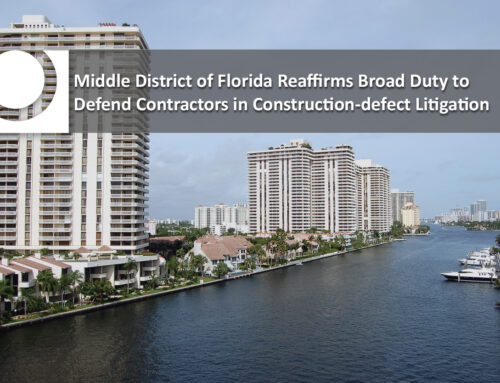It is common practice in Florida for companies offering emergency-restoration services to
take an assignment of the insured’s property-damage claim against the insured’s property policy in lieu of the insured paying the restoration company directly and then seeking reimbursement from an insurer.
For instance, imagine that a pipe bursts in your home, flooding a bedroom. The restoration company will come out, remove the water and damaged property, take an assignment of your claim against your insurer (and, depending on your deductible, you paying the deductible), and then seek payment directly from the insurer. Usually this goes off without a hitch. But recently Security First Insurance Company (“Security”) wanted to test this method, and it failed.
In One Call Property Serv., Inc. v. Security First Ins. Co. (Fla. Ct. App. May 20, 2015), One Call Property Services (“One Call”) performed emergency water-removal services for Security’s insured and, as payment for One Call’s services, the insured assigned his rights to the insurance proceeds. Security denied the claim, so One Call filed a lawsuit against Security for breach of contract for failure to pay policy benefits.
Security filed a motion to dismiss and successfully argued to the trial court that One Call lacked standing to maintain the lawsuit because the assignment was invalid under the terms of the policy. Specifically, Security argued that the policy’s anti-assignment provision, when read in conjunction with the loss-payment provision precluded One Call, as the assignee, from bringing a lawsuit to determine the amount of the loss. In other words, Security’s position was that the insured had nothing to assign because, at the time of assignment, there were no benefits due and owing to the insured under the policy.
Based on the following reasons, the Court of Appeal of the Fourth District reversed the dismissal of the complaint.
- First, the court reiterated that Florida law is clear that an insured may assign a post-loss claim even if the policy contains an anti-assignment provision.
- Second, the court held that a loss-payment provision does not preclude an assignment of a post-loss claim, even when payment is not due. The court reasoned that the provision merely addresses the timing of the payment and expressly contemplates a lawsuit could occur before payment is due.
- Lastly, the court held that an assignable right to benefits accrues on the date of the loss, even though payment is not due under the loss-payment clause.
The Fourth District then passed on evaluating the public-policy arguments for and against post-loss assignments:
On the one side, the insurance industry argues that assignment of benefits allow contractors to unilaterally set the value of a claim and demand payment for fraudulent or inflated invoices. On the other side, contractors argue that assignments of benefits allow homeowners to hire contractors for emergency repairs immediately after a loss, particularly in situations where the homeowners cannot afford to pay the contractors up front.
The decision is advantageous to service providers and insureds alike because it reaffirms Florida law and allows for an insured to receive covered emergency services without having to come out of pocket for the services.
Opinion reprinted from WestlawNext with permission of Thomson Reuters. If you wish to check the currency of this case by using KeyCite on WestlawNext, please visit www.next.westlaw.com.



